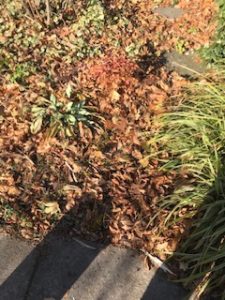
Leaves will remain in the garden

Leaves will remain in the garden

Leaves will remain in the garden

Leaves left in the yard
Pete Seeger’s song “Garbage,” written by Bill Steele, has a famous refrain that carries the following message:
Garbage (garbage, garbage, garbage) Garbage!
We’re filling up the world with garbage (garbage…)
What will we do when there’s no place left
To put all the garbage? (garbage…)
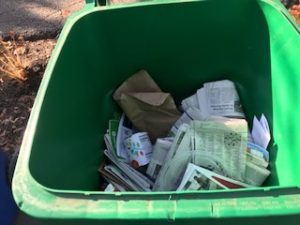
Lots to recycle.
Next, we recycle our paper, plastic, and metal to reduce the amount of trash. Most weeks my green recycling bin, pictured above, contains far more stuff than my blue trash bin, pictured below. This week’s blue bin holds but two bags, filled with citrus peels and materials excluded from recycling. In addition, to keep our garbage bin near empty, we compost food scraps in our backyard bins.
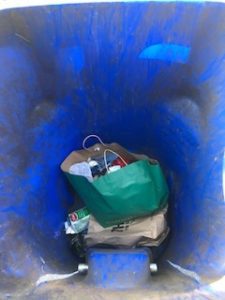
Almost empty garbage bin
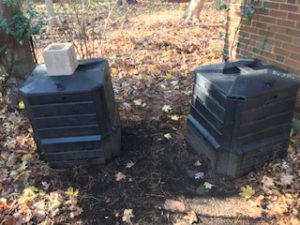
Backyard composting
Into the compost we place vegetable and fruit cuttings and scraps. We exclude meat and fish scraps and bones to avoid attracting unwanted scavengers. We also exclude citrus peels as they can impede the breakdown of waste into compost, or so we have been advised.
When one of the bins fills, which can take a few years, I transfer the rich fertilizer to our raised vegetable beds. It really helps! Even in December, we are still harvesting arugula and mustard greens:
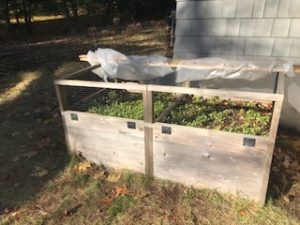
December’s harvest
Naturally, we cover the beds with plastic on cold nights to protect them against the frost. So far the mustard greens and arugula have continued to grow, however slowly, as winter approaches.
All these activities, besides providing my wife and me with enjoyment and satisfaction, also help to reduce our contribution to the accumulation of trash in Newton. We even reuse stretch plastic bags or recycle them at the supermarket. A simple act such as recycling, repurposing, or reusing something keeps us from “filling up the world with garbage.”

I highly recommend the city’s compost pick-up contractor: Black Earth. We have been using it for 2 years, and all the citrus rinds and food scraps that might attract pests can go in the bin. And we get a discount on bagged finished compost (which makes great mulch, btw), which they deliver. For those of us who aren’t shoveling out compost bins anymore, it’s a wonderful convenience. With careful purchasing (avoiding one-use packaging), some weeks, we don’t even have a bag for the blue bin!
Oh—and on those weeks when the blue or green bin isn’t close to full, you can save some trash truck diesel by not putting out your bin until it is.
We could start by reducing all the useless crap we buy
– disposable fashion trend. Buying clothes only for one season or 1 year is crazy on the face of it
– short term renovation trends, buying ikea furniture only to junk it 3 years later
– fancy wrapping on food. nice presentation, but what a crazy waste
– buying a new iphone every 1-2 years. Crazy
– anyone buying an SUV but don’t go offroading.
.. but this would require REAL sacrifice, so I guess climate change is only an existential threat when the solution is building 1000’s of luxury rental units
@bugek – a lot of us avoid needless consumption, and I have seen messaging around the issue.
That said, the people I know who get Ikea furniture keep it for years. They do it because that’s what they can afford, not because they plan to junk it. And there are reasons to get an SUV besides off-roading, and the alternative choices that fit those needs aren’t necessarily any more ecological.
A little pedantry here, in the name of credit-where-credit’s-due: Pete Seeger certainly helped popularize “Garbage,” but it was actually written by Bill Steele.
Thanks. I will make a revision to that effect.
Radical idea, the blue and green bins could surcharged by weight.
The garbage truck could easily be modified to weigh each bin when picking up. This would reduce waste SIGNIFICANTLY and would require actual sacrifice as we claim to have a climate crisis
We also need to hold developers responsible for polluting. On Nov 12, construction work at 239 Jackson Street generated copious amounts of what appeared to be Styrofoam pellets and smaller Styrofoam particles, flying through the air and landing everywhere. The Styrofoam pellets and particles were all over many of the abutters’ yards as well as into gardens, flower beds, AC units, window screens, garages, houses (some of us had our windows open, it was warm that day) outdoor plant pots used for growing vegetables, as well as appearing in screened-in back porches. As you know, the wide distribution of these particles/dust is a health hazard and this is harmful to breathe.This contaminates the soil. In addition, I do not think it is legal to pollute other people’s property. A clear infraction of the law had occurred and the neighbors believed that the developer would be mandated to 100% clean up all of this pollution he created. Styrofoam is a non-biodegradable material that cannot be left to pollute the neighborhood. We believed it was the developer’s responsibility to determine the breadth and width of this pollution and then clean it all up.
One of the neighbors contacted Grady Dante of the MassDEP Northeast Regional Office who said that the developer at 239 Jackson needs to contact a company that does asbestos removal to clean up this environmental hazard. This was not done. In fact, the clean up that was done (after many complaints and a work stop order) was haphazard and insufficient. A company called S&S came with what looked to be leaf blowers that were being used as vacuums to suck up the particles. It worked OK for the hard, flat areas such as the sidewalks, it worked less effectively for the grass and was not at all effective for areas that were more dirt. In addition, the developer made no effort to inspect how far and wide these Styrofoam pellets and particles went. They only cleaned the lawns of the people who contacted IDS, basically the neighbors who live right around me after I told them to do so. But most of the area never got cleaned up.
The occupants at the end of Walter St didn’t think they had the Styrofoam because they didn’t see large pellets like what we had. But when they looked more closely, there were smaller Styrofoam particles in their lawn and on their porch. The neighbors across the street can still see the Styrofoam pieces in their grass. One neighbor hadn’t looked right away because she calculated her house is about 10,000 feet from the construction site – but lo and behold, she had the Styrofoam in her front and back lawns and in her gutters. The occupants of a house on Jackson have health/personal issues and are most likely unaware of what has been going on, but there is a lot of Styrofoam in their yard. I don’t think this pollutant should be allowed to remain there solely because they aren’t able to deal with this right now.
The point is, there was no requirement or mandate that the developer identify how far and wide this went, and then for the developer to do an environmental clean up. Just a few of us received the vacuum clean-up, and even that did not totally resolve the problem.
It has been almost a month with a lot of rain and wind storms, and I am sure by now the styrofoam has been buried in the dirt and blown around so much that it isn’t as visible. My fear is now it is too late. We are probably permanently contaminated.
The neighbors tried very hard to get the developer to take responsibility and clean up this mess – we contacted our city councilors, the mayor, MassDep and the building inspectors.
If someone can tell me how to post pictures, I will.
I enjoyed Bob’s article on waste reduction!
Please let me take this opportunity to share a related super-easy way we may act to reduce the city’s recycling pickup burden: if my green recycling bin is less than half full, I don’t put it out. On average I put out recycling biweekly. If my recycling output is about average for the city, and similar households did the same, it could reduce the number of stops recycling trucks make by about half. This would make the work of truck drivers more efficient, and save the city a chunk of time, money, fuel and noise. The strategy does not reduce the total amount of recycling, but reduces the environmental and financial impacts of recycling pickup. Of course households may be already doing this, and I’m just late to the party!
The City of Newton has put a massive effort into recycling at significant cost to taxpayers. But I wonder if anyone from the City actually monitors what happens to the recyclable materials we put out for collection? I’ve read that much of it actually ends up in landfills because it has such little value that there is no market for it. Anyone know what percentage of our green bin materials are actually recycled?
I suspect that’s the ugly truth ever since 3rd world countries have refused to have our trash shipped to them.
No brave journalist out there willing to be “cancelled” to find out the truth?
Recycling, tax on paper bags, etc…. all things to make people feel good. Bottom line is, though, if people want to truly create less garbage, they would consume less. Of course, the U.S. economy is built on consumption and Newton is no different than the rest in its habit of mass consumption. Nice post, Bob, but as a generalization, I look at the wealth and consumption by people in Newton and I see hypocrisy and contradiction.
As far as that goes, the average American, from almost any class background, consumes far more of the world’s resources than most of the rest of the world’s inhabitants. For that reason, I could argue that population control matters more in the affluent west than in the developing world as far as preserving the natural world is concerned.
On another note (this topic never goes away), we all understand why so many people in Africa and Asia and Latin America want to move to Europe and North America. Facing harsh economic realities at home as well as political repression and even gang violence, they are seeking a better way of life. We might do the same if we lived there. It makes no sense, however, for everyone to move here. Somehow, in some way, the world community must improve living conditions where people currently are.
I acknowledge, of course, that the United Nations failed miserably in that very mission. No other coalition with a common goal has risen in its stead. Still, until life gets better in the developing world, expect millions of refugees to flee despair and head for the promised land, as they see it.
Not yet mentioned here is the move toward Extended Producer Responsibility (EPR), where manufacturers and packagers are required to do more to reduce the packaging burden of new products at the source. Maine and Oregon have passed EPR laws.
https://www.wastedive.com/news/extended-producer-responsibility-packaging-maine-oregon/602479/
After retiring from the Federal Government, I spent several years working on environmental related projects with the Irish Institute at Boston College. These worked to forge cross border networks among government officials and NGO representatives from both the Republic of Ireland and Northern Ireland. This was a tiny derivative of the so-called Good Friday peace accords that sought to end over 4 centuries of strife on the island.
Participants from both parts of Ireland were shocked at the amount of municipal and packaging waste we generated in Massachusetts. EU regulations were already in place to prevent that from happening over there. I helped put together a rough analysis of the per capita waste generated in the Republic and our own state. It was less than half there as it was here. Not certain what the current figures are, but suspect it hasn’t changed all that much.
As a member of the Sustainable Materials Management Commission (the group that advises the mayor and City Council on matters relating to solid waste, i.e., trash, recycling, organics, etc.), I’m delighted to see this post on V14 and the interest in this topic.
Concerned about the slowdown in Newton’s waste reduction and its implications for both the environment AND the City’s finances, the SMMC in late 2021 released a report containing a set of recommendations regarding Newton’s curbside residential waste management: https://www.newtonma.gov/home/showpublisheddocument/77989/637738632072200000
This report has been presented to both the mayor and the City Council, as well as to the public at a library forum and an LWV event. I heartily recommend that everyone who has posted on this thread (and all of you lurkers out there) also read the report, as it contains thorough analyses of waste/recycling/composting trends in the City, case studies of approaches taken by other municipalities, and a series of realistic recommendations based on what is working in other places.
If you don’t have the time or energy to read the whole report, you can read the excellent summary on Green Newton’s website: https://greennewton.org/smmc-report/
It is always a good day when the venerable Bob Burke weighs in with useful experiences and observations. I am also delighted that Meryl Kessler has provided excellent links to enlighten us further.
There’s more to waste management and recycling than “virtue-signalling,” a term as fraught with Trumpist overtones as the derisive “woke,” used to disparage any effort to address the endemic prejudice, racism, and anti-semitism still rampant in contemporary society, our progress notwithstanding. Yes, campus “progressives” often get doctrinaire and go too far with their critiques of society. But societal bigotry and injustice persist.
How much of what goes into our green trash barrels actually gets recycled?
you are not supposed to question the narrative.
Has anyone been to Fulfilled Goods a “low waste market and refillery” yet? Looks like they are finally open. I’ve been meaning to swing by.
I love it there! I also bring my WASHED and used GLASS containers there for others to use
My family is trying to reduce our waste. Here is what our family of four does, and others can adopt what they think will work for them.
* Exclusive use of canvas bags when grocery shopping.
* Using cloth napkins every day. I haven’t purchased paper napkins in years. I have about 24 cloth napkins that we use.
* I use these when I pack my kids lunch https://albatrossdesigns.it/collections/take-back-ware
* I use plastic containers to pack my kids lunch instead of plastic bags that are tossed at the end of the day.
* I buy pods from Cleenland and FulFilled Goods for my washing machine
* We order TP from Who Gives a Crap – made from recycled paper
* Give things away on the local BUY NOTHING site and FIND things there too. Avoid tossing into the can.
* One of our cars is a Prius
Cleanland
https://www.cleenland.com/
We compost using which makes it very easy.
https://blackearthcompost.com/
It is hard to go zero waste, and I urge families to do what they can. We started with the cloth napkins and have grown into other products. Take little steps.
I forgot to mention I also use these
https://www.netzerocompany.com/collections/eco-bags/products/cotton-mesh-reusable-produce-bags
I hated the small clear produce bags at the grocery store. So, I put my 8 apples in my cart. But using these bags have really helped me. I don’t lose the apples, and I can use them over and over again!
There are numerous excellent suggestions on this blog post and the submitted comments.
I will add mine, which may be close to author Bob Jampols’s heart: Countless used tennis balls end up in the trash, whether they filling the trash bins at City courts or home trash. Local Nonantum store Schwartz Hardware on Watertown Street has a bucket by the front door filled with used tennis balls that they then sell individually for 10 cents apiece. People then purchase the used tennis balls for their rollators, walkers, or bottoms of chairs.
There is more demand than Schwartz can fill so save ‘em up and bring them to Schwartz. Seniors and others will appreciate it.
*Swartz.
Thanks, Jane!